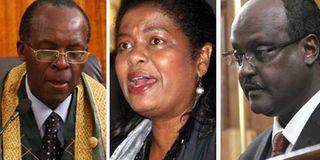Three judges spared misconduct probe

From left, Supreme Court Judges Jackton Ojwang, Njoki Ndung’u and Mohammed Ibrahim. The Judicial Service Commission had recommended the three judges be reprimanded for misconduct. FILE PHOTO |
What you need to know:
Justice Korir ruled that JSC is not mandated or required to admonish any form of discipline against judges.
The judge dismissed the petition by former Law Society of Kenya boss Apollo Mboya and said it lacked merit.
Three Supreme Court judges have been spared from facing allegations of gross misconduct which were hanging over their shoulders for four years.
High Court Judge Weldon Korir ruled that the Judicial Service Commission violated the law by purporting to admonish Justices Mohammed Ibrahim, Jackton Ojwang' and Njoki Ndung’u in 2016, after a complaint on gross misconduct was levelled against them.
Justice Korir ruled that JSC is not mandated or required to admonish any form of discipline against judges.
In his decision, the judge said the purported administrative action taken against them was unlawful and has no legal backing.
The judge dismissed the petition by former Law Society of Kenya boss Apollo Mboya and said it lacked merit.
“Since the JSC has no authority to discipline a judge, it follows that it cannot sanction a judge, an admonition or a reprimand is the same thing.
"By admonishing Justice Ndung’u, the JSC crossed its constitutional and statutory boundaries which limits its powers to determining the merits of the complaint against a judge for the sole purpose of determining whether the petition should be send to the President,” ruled Justice Korir.
Even though JSC did not forward their names to the President so as to be investigated by a tribunal as required by law, the three judges wanted the 2016 decision by JSC quashed in its entirety so that the matter does not come to haunt them ever.
But Mr Mboya had asked the court to compel JSC to send their names to the head of state.
Considering that there was an allegation that the Supreme Court judges violated oath of office and went on strike at one time, Justice Korir said it was proper for JSC to have taken administrative action in this incident.
But since the JSC had found that indeed there a misconduct on the part of the judges over this specific allegation, Justice Korir pointed out that this was not defined as gross hence was not a ground for their removal as determined by the commission.
However the judge also agreed with Justice Ndung’u’s argument that there is a lack of clarity on what judges, judicial officers and Judiciary staff facing allegations which warrant administrative action such as this one are to expect beforehand while going through that process.
While the commission said that the regulations in this regard are stuck in the National Assembly, the judge declined to compel JSC to make those laws within three months on grounds that the court cannot compel it to do something that is in the hands of another state organ.
In Mr Mboya’s petition at JSC, he had accused them of acting in gross misconduct for by suspending the Court of Appeal’s verdict concerning the retirement age of former Deputy Chief Justice Kalpana Rawal and suspended retired judge Phillip Tunoi.
He had also accused them of going on a go-slow in solidarity with their now two retired colleagues who were fighting their retirement age at 70, hence the trio ruled that they were to retire at age 74 because they were appointed under the old constitution.
He also accused them of determining a case that was not before them in order to influence the outcome of the case in which Justices Rawal and Tunoi had challenged their retirement age.
The disputed age verdict was issued in an election petition involving Kanu Secretary General Nick Salat on the Bomet Senatorial seat which he lost to Wilfred Lesan.
While Mr Mboya moved to the High Court having lost his case at the JSC, Justice Ndung’u also filed a suit to challenge the claims against her.
In 2016, Justice Joseph Onguto declined to bar JSC from investigating her for gross misconduct.
But the court has now ruled that the JSC’s probe against the three judges was unlawful.





